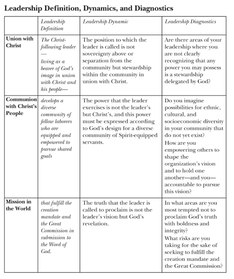 It's rare that a book sets out to completely unravel a long-held paradigm. It's rarer when that book not only succeeds at unraveling a paradigm but builds one stronger in its place. I'm grateful for the work done by a couple of my doctoral professors, Timothy Jones & Michael Wilder, in their book The God Who Goes Before You: Pastoral Leadership as Christ Centered Followership. If you've studied any level of Christian leadership, you're familiar with how the church has sought to borrow/implement/use/steal/baptize ideas about leadership from the Marketplace. With good intentions, we've read how Jesus was a Situational Leader, or that Jesus was a model of management, or any number of other ways to think about secular leadership ideas in a Christian framework. Like my kids do when they can't make the puzzle piece fit just right, sometimes if you force it to work you can make it work just good enough. Oddly enough, that's also my philosophy when it comes to home repairs. Jones & Wilder work to completely undo our preconceived notions about forcing Marketplace leadership into ministry. Instead, they propose looking long and hard at the storyline of Scripture and the example & teaching of Jesus as the paradigm for Christian leadership.  One question they pose that stuck with me after reading it was "Did Jesus have to be raised from the dead for this truth about leadership to work?" The motivation behind this question is to lead to the development of a distinctly Christian sense of leadership, in particular as it relates to pastoral ministry. My 5 greatest takeaways from this book were: 1. Leading starts with following - If we're not following Jesus, loving Jesus, learning from Jesus, and growing in devotion to Jesus, nothing we do matters. 2. Leadership happens among, not above - If we want to be faithful pastors, we must be shepherds who lead and live among the sheep. We cannot expect to lead without being among people. Trust is our currency, and it accumulates very slowly. Nor can we think ourselves above the people God entrusts us with. 3. It's not about us - We are stewards, not sovereigns. We have a responsibility to love, serve, provide, share, teach, and lead those around us. But it's not about our Kingdom. Jesus doesn't need us to accomplish His mission. 4. Following means trusting God - Our first call as shepherd leaders is to follow Jesus, which means we must live in a way that demonstrates our unwavering trust in His good guidance. It's not always a painless trust (there's a lot to be said about suffering/hardship in ministry), but it's a trust that enables us to let go of our kingdom and live for a Greater. 5. Leading as a shepherd, not CEO, is our model - The idea of spiritual leadership in the church is one of a shepherd who provides, protects, and is present, among the flock. It means we have a task to feed, love, shield, and get our hands dirty among people. There's a lengthy 3 chapter treatment on the Prophet-Priest-King typology that Dr. Jones critiques, which was helpful because I've often found that typology useful in understanding the general tasks of pastoral ministry. If you're not familiar with it, it's basically the Milkstool 2.0 (Preaching, Administration, and Pastoral Care). Unfortunately, like Jones, I've ran across a number of people who pigeon-hole themselves into one and think they can punt the others and be faithful pastors. If you're in church leadership, grab a copy. Take your team through it. And pass it on to others in ministry. They'll find this book one that provokes their thinking about what God has called them to.
0 Comments
Leave a Reply. |
Scott M. DouglasA blog about leadership and the lasting legacy of family ministry. Archives
August 2023
Categories
All
|
 RSS Feed
RSS Feed



